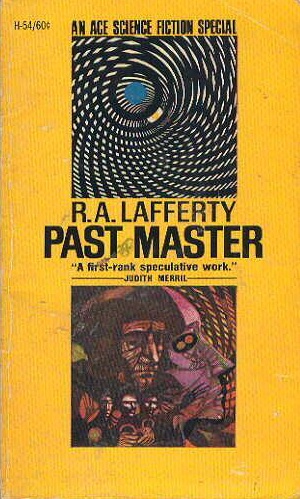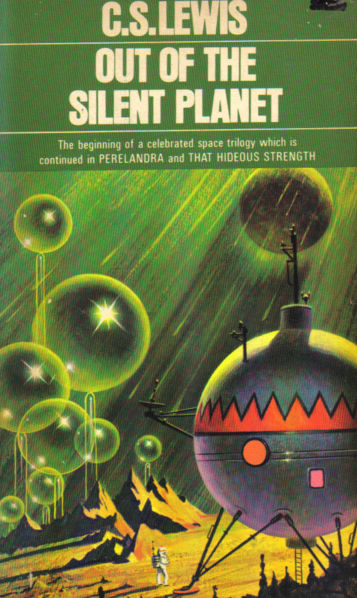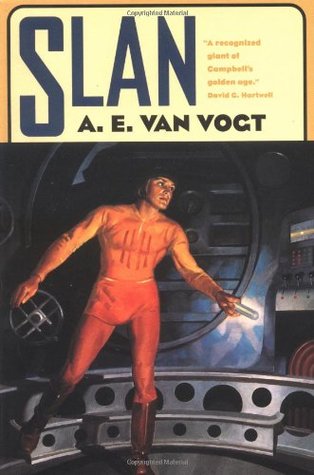By John Hertz: We’ll discuss three Classics of S-F at Sasquan the 73rd World Science Fiction Convention, one discussion each. Come to as many as you like. You’ll be welcome to join in.
We’ll start with “A classic is a work that survives its time. After the currents which might have buoyed it have changed, it remains, and is seen to be worthwhile for itself.” If you have a better definition, bring it.
Each of our three is interesting in a different way. Each may be more interesting now than when first published.
R.A. Lafferty, Past Master (1968)
 Sasquan is the Worldcon in Lafferty’s centennial year. He was one of our most original voices. Here Thomas More is brought five centuries across time and space, maybe to help – as defined by whom? Judith Merril said the story “magics me with humor, anger, and love … unpredictable corner-of-the-eye perspectives and perceptions … above all … with … word-music.” You might like this book note by me.
Sasquan is the Worldcon in Lafferty’s centennial year. He was one of our most original voices. Here Thomas More is brought five centuries across time and space, maybe to help – as defined by whom? Judith Merril said the story “magics me with humor, anger, and love … unpredictable corner-of-the-eye perspectives and perceptions … above all … with … word-music.” You might like this book note by me.
C.S. Lewis, Out of the Silent Planet (1938)
 Weston, who clothes himself in the trappings of science, is a caricature. Yet it is he who gets the party to Malacandra; who gets them, almost impossibly, back again. Theodore Sturgeon said “Science fiction is knowledge fiction.” Chapter 9 says “The love of knowledge is a kind of madness.” We never do hear about the space drive.
Weston, who clothes himself in the trappings of science, is a caricature. Yet it is he who gets the party to Malacandra; who gets them, almost impossibly, back again. Theodore Sturgeon said “Science fiction is knowledge fiction.” Chapter 9 says “The love of knowledge is a kind of madness.” We never do hear about the space drive.
A. E. Van Vogt, Slan (1946)
 Van Vogt, praised as a stylist by no less than Harlan Ellison, won readers of the day with more sophistication than they may have noticed. Beginning in the aftermath of the main action – jump-cuts, breathtaking speed, reversals – a Bildungsroman that starts with its hero nine years old – dialogue and development that in fact barely hint – unemphasized satire of persecution and opposition, of supposing the worst.
Van Vogt, praised as a stylist by no less than Harlan Ellison, won readers of the day with more sophistication than they may have noticed. Beginning in the aftermath of the main action – jump-cuts, breathtaking speed, reversals – a Bildungsroman that starts with its hero nine years old – dialogue and development that in fact barely hint – unemphasized satire of persecution and opposition, of supposing the worst.
Past Master and Slan are each first novels after much at shorter length; Out of the Silent Planet is its author’s first s-f novel.
Have you read them? Have you re-read them?
Discover more from File 770
Subscribe to get the latest posts to your email.

I’d agree they are all classics, but whether any of then still carry any weight today is arguable. I remember reading them all, of course, but I doubt any young fan reading today would bother. In fact a lot of young *fans* don’t bother reading anything any more and would rather pin their flags to productions in other media, such as the GoT TV series or blockbuster Hollywood films. Despite us all supposedly being part of a wide family, I admit I have difficulty in personally conversing with them about our differing enthusiasms. This is not to say I’m not perfectly able to chit-chat with them on general matters at either conventions or things like Facebook. I am aware though, as Ted White often bemoans, that *my* fandom is very much in decline and not much valued at all except by a few sad die-hards (like me and Ted).
I’ve read all three, and re-read Slan, but why would the young fan choose these over newer books? I read older stuff as a kid because they were available in the library, but there’s a lot more stuff a lot easier to access these days.
“I’d agree they are all classics, but whether any of then still carry any weight today is arguable.”
Of course they carry weight today. I mean you can argue that, sure… but you’d be wrong to.
“I remember reading them all, of course, but I doubt any young fan reading today would bother.”
Too bad for them. They’re missing out.
“In fact a lot of young *fans* don’t bother reading anything any more and would rather pin their flags to productions in other media, such as the GoT TV series or blockbuster Hollywood films.”
Maybe they would read more if the books were different.
“Despite us all supposedly being part of a wide family, I admit I have difficulty in personally conversing with them about our differing enthusiasms.”
I wouldn’t sweat it. I only have time to really get into about ten different tabletop games. I can still kibitz right along with people that love totally different ones. Even the scuffles we have over genres and editions are part of the enjoyment that goes with the hobby– and those rivalries do end up creating opportunities for cross-pollination.
I encourage all of you to come to the program items about these at Sasquan, and discuss them in person. I get to as many of Hertz’s “Classics” discussions as I can, and they’re always interesting discussions. Sometimes we spend a lot of time discussing whether the work in question is a classic, by John’s definition or any other. At least once, we spent almost the entire session arguing about whether the book in question was science fiction.
I’ve read all three but quite some time ago – I remember being the most puzzled by “Past Master,” so that’s the one I would reread and discuss at Sasquan. Must drop a postcard to Mr. Hertz to offer my participation in the panel. (He and I talked about “Flatland” on one of his panels a few years ago.)
Sounds very interesting. I have never read Slan but read the other 2 when I was 13-14 years old, i.e. 40-some years ago. I have been meaning to re-read Past Master (and other Lafferty) for some time now. I got a great kick out of his stuff when I was young but I suspect I missed quite a bit. I’m pretty sure I’d get more out of Past Master in particular, as a more mature person and reader.
A bunch of the younger sf fans I know very much like the opportunity to read older works and discuss them, when there’s the prospect of some real learning – the context of the work in the author’s career, the author’s place in sf, influences on the work and works influenced by it, and so on. They like learning the stuff that helps them appreciate older work. And I am happy to feed the beast, and to refrain (mostly 🙂 ) from judging them for not already having the life context that, say, I do for being 20-30 years older.
And Past Master is the one my library system doesn’t have any copies of, so I’m either going to have to find a copy at Readercon, or manage to do some successful attic archaeology to find the copy that I own.
Disappointing to see Sasquan celebrate the centenary of R. A. Lafferty’s birth, but not that of James Tiptree, Jr.
Any chance of adding any of her work?
PAST MASTER is available as a paperback somewhere on line. Hardcover editions (there were two) are hard to come by. Lafferty got fussy with his book, claiming it was a failure because few understood it, and praised the wrong things in it, or failed to realize what the book was trying to do. An aspect of it is rebelling against a society that provides you with everything, and escaping that society to live in poverty.
No, I won’t be as Sasquan.
To Martin Wisse – John Hertz selects books he thinks would be interesting to talk about, and then each Worldcon programming committee adds his discussions to its program. So Sasquan isn’t officially celebrating one author and ignoring the other. But you could go to their website, find the emal address for the Program Department, and suggest they add an item – could be a discussion of a specific book, like John does, or an overview of ther work. There could well be slots still open in their schedule.
Jerry Kaufman: Agree with your general points, though there’s also an essential ingredient of perseverance John adds to the equation. A suggestion alone might not be acted upon.
Martin Wisse: A dedicated discussion of a specific book is just a format. Attention is paid to small subsets of work in most sercon program items — like a panel discussing a subgenre of stories.
I wish to point out that the C.S. Lewis Space trilogy is public domain in Canada and available online from Gutenberg Project Canada without charge (as is much of Lewis’s other fiction). The volume John Hertz will be discussing is available in several e-book formats
Rick Moen
[email protected]
Mike: it wouldn’t do to discuss everything. You would get nowhere, as you have noticed with the recent discussions of “Sad Puppies”, the worth and value of specific kinds of writing for specific awards…and so on.
We rang in Lafferty’s centennial at the London Worldcon last year (as well as the DC World Fantasy), but I guess it still counts if you’re looking at the Worldcon that would be taking place in his 100th year? Either way, glad to see more discussion of his works, and wish I could make it out there to take part! Since I can’t though, I would be immensely grateful (and I’m sure others woudl as well, including quite a few Japanese and European Lafferty fans) if anyone at the Past Master discussion would be able to record it for posterity and future research.